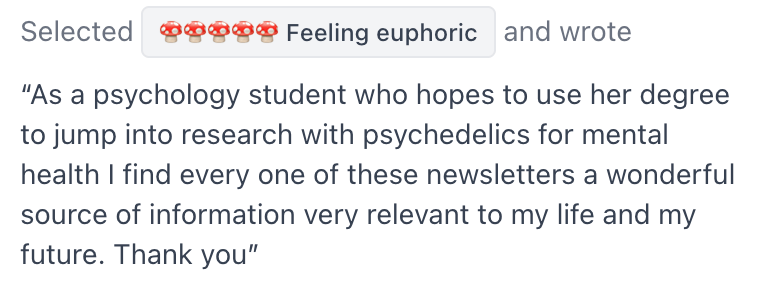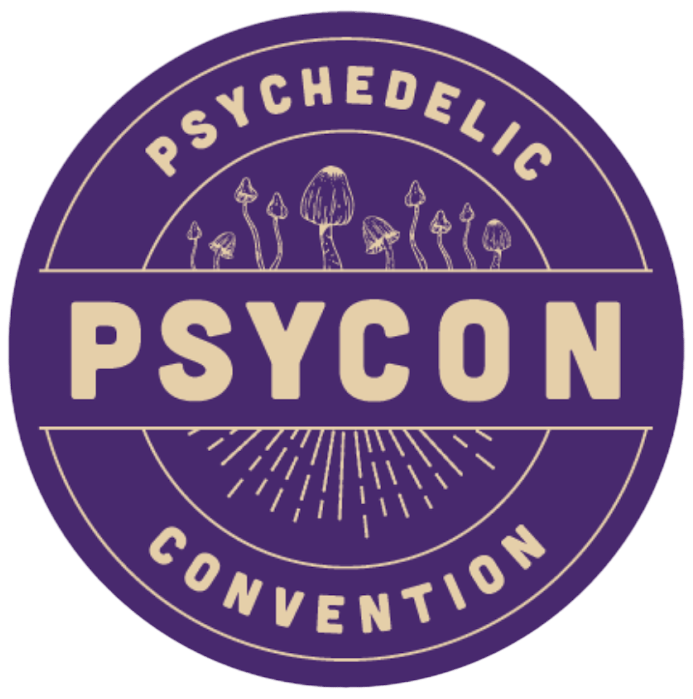PRESENTED BY ALTHEA & FOUNDATIONS 🤝
Welcome to Tricycle Day. We’re the psychedelics newsletter that thinks disregarding ~50% of the human population is a bad idea. Unless we’re talking about the 50% who clap when the plane lands. They’re a lost cause. 🫠
Dr. Grace Blest-Hopley realized as soon as she peeked at the literature that psychedelic science had a massive blind spot: women. (Actually, it’s not just psychedelic science, but that’s neither here nor there.) So she created a nonprofit research organization to fill in the gaps.
We asked Grace about women's experiences with psychedelics and how they differ from men's, the critical oversight in most clinical research that’s sabotaging our data, and some conditions and symptoms specific to women where psychedelics seem to help.
FROM OUR SPONSORS
The next big psychedelic conference is happening in Vegas this October. You’re comin' with.
While many events stick to theory, PsyCon brings together the full array of people actually building this $10+ billion industry.
You’ll meet the NFL legend using psychedelics for peak performance, the researchers publishing breakthrough studies, even the retreat operators scaling transformational experiences.
This is your invitation to drop in for two days with the practitioners and entrepreneurs shaping psychedelics' future.

What got you interested in studying psychedelics, and how did you narrow your focus to women's health specifically?
My interest in psychedelics came about from doing my PhD in cannabis and its effects on the brain. I was finishing up that neuroimaging-based PhD at King's College London around the same time that Imperial College started doing their first neuroimaging studies with psilocybin and LSD. It was a very similar research technique to what I was using, but with a different set of substances that I found fascinating.
Prior to that, I'd seen some things with my own eyes at parties where friends who were suffering with depressive disorders had taken psychedelics. I'd seen this almost instant change in them where they'd gone from being completely reclusive to very social and open, and the change had lasted. So I already had a feeling that these substances were doing something, but once I saw that initial work coming out of Imperial, it allowed me to engage with the topic from an academic level.
After I finished my PhD, I joined the British Armed Forces and became a reserve officer. While I was in the military, I was becoming increasingly aware of the differences in physique and lived experiences when in a woman's body. Despite being a well-educated neuroscientist in my mid-twenties, I was only just starting to associate the idea that I would become emotional every four weeks with my menstrual cycle. That's how lacking the education is around this topic.
I started to hear stories of women around me who had taken psychedelics and noticed immediate changes in negative symptoms associated with the menstrual cycle. I went to the literature to try and understand what was happening and realized there was a huge gap in information about women's biology and psychedelics. I was genuinely shocked and thought, this can't be going on in 2022 in this emerging field where psychedelics are forcing us to rewrite how we understand psychiatry. Women have higher rates of diagnosis for these conditions, yet we were being wholesale ignored!
Once you dig into the mechanism, you start to understand how female biology affects neuropsychopharmacology—our brain, our mindset, our mood. You start to realize how important it is in the context of psychedelics. That's when I decided to found Hystelica, our nonprofit built specifically to tackle questions around women and psychedelic use.
So far, what has Hystelica's research shown you about how women's experiences with psychedelics differ from men's?
The mission of Hystelica has always been to shine a light on the area of women and psychedelics, from the fundamental neuroscience to the psychosocial implications. So the first step was to define the problem and convince everyone that Hystelica was needed—that there is a difference between men and women that is relevant in the context of these substances. A lot of that has come down to educating people, including research organizations and academic institutions, about fundamental female biology. Now, we're moving into the solution phase.
For the last two years, we’ve been conducting an observational research study that asks women about their experiences with psychedelics, changes they may have seen in their menstrual cycle or menopause symptoms, and the conditions they may have been seeking psychedelics for. Participants often mention menopause, infertility, PMDD, and eating disorders, all issues that either are specific to or disproportionately affect women. The reasons they reported for using psychedelics ranged from the medical, like chronic pain and endometriosis, to more of the psychosocial aspects.
We've also started to see that women who take psychedelics at different times of the month realize that their experience varies. As their hormones change, their serotonin system is primed in a different way, and therefore it makes sense that the psychedelic experience itself is affected. We hope to have the results of this survey out by the end of this year.
Can you speak to the outcomes? Are the women who report using psychedelics for these sorts of issues getting relief?
We're already seeing some really exciting developments in the postpartum depression space from other Phase 2 work that's come out in the last 12 months. With menopause, I've looked at some of our preliminary data, and we certainly see a big improvement in brain fog, anxiety, and depression—symptoms that women report as some of the most troubling during perimenopause and menopause.
I'm also in the fortunate position that people have started to recognize me for this work and tell me their stories. I've heard incredible reports from women, particularly women in late perimenopause, who’ve had profound experiences that have not only improved the symptomatology but really allowed them to move through the transition psychologically.
One other interesting pattern we've seen emerging is possible menstrual regulation. Women who've lost their menstrual cycle, perhaps due to a previous eating disorder, have taken a large dose of psychedelics and their menstrual cycle has returned. Similarly, women who’ve had highly dysregulated menstrual cycles have taken psychedelics, and then it has returned what we might call a more regulated cycle.
AN OFFER FROM OUR SPONSORS
💦 Plant-based gushers: JUNGL’s juicy cannabis bites contain no artificial sweeteners, seed oils, or synthetic dyes. And every bite supports wildlife conservation. Use code TRI30 for 30% off.
What about trauma and depression, which can affect anyone? Have you found evidence that women might need a different approach to psychedelic therapy for these conditions?
Absolutely. I think even just a different level of language and consideration for who is in the room facilitating is extremely important. When we have female military veterans who've had sexual trauma, is it appropriate that they're then in a room with ten men who may look and feel like the perpetrator? How appropriate is it for a male facilitator to be in the room, let alone touching them at any point during that experience?
Then, understanding where women are within their menstrual cycle throughout the whole process from enrollment to the end of formal integration is important because intrusive thought patterns fluctuate during our monthly cycles. Knowing that a woman is in a phase where intrusive thought patterns are particularly high allows any prep or integration to be framed in that context.
This is one of the most fundamental problems with clinical research on women, actually. Anxiety, depression, psychosis, and PTSD all have a very high prevalence in women of something called “premenstrual exacerbation,” which is the worsening of symptoms during a certain time of the month. If you don't know how much that woman is naturally fluctuating in symptomatology when you take baseline and post-treatment measurements, your data could be flawed. You may have measured a significant improvement, but you measured at the wrong time and now it's not significant, or the treatment effect could look way more significant than it really is.
If funding and resources weren't an issue, what's the research question you'd be most excited to tackle next?
I would like to start with a very basic question: what are the differences, on a fundamental neuroscience basis, using fMRI, in the way that a female brain responds to psychedelics at different hormonal states? Nobody's done that yet. I've already got a protocol drafted for how I would do this research. It'd be a beautiful PhD project if someone wants to support Hystelica and a student to run it.
But that’s not the last research question I’d like to answer. Ultimately, I would like to license medicines and protocols using psychedelics that are tested specifically for women. The first program would be for treating PMDD. We already have preliminary self-reported data suggesting psilocybin helps, but there's still work to be done around exactly how and when in the cycle to use it. We've got a protocol ready for a Phase 2 trial that has required careful thought from myself and Hystelica Research Director Dr. Zahira Cohen about the disorder itself as well as the complex implication of any psychedelic protocol. We’ve done the initial hard work, and with the right drug product and funding, we’re good to go.
Want more from Grace?
Participate in one of Hystelica’s research surveys, sign up for their newsletter, or take their course on psychedelics and women’s biology.
UNTIL NEXT TIME
That’s all for today, Cyclists! Whenever you’re ready, here’s how we can help.
📣 Promote your brand to 76k psychedelic enthusiasts.
Sponsor Tricycle Day.
🔍 Find a professional who can support your growth and healing.
Browse Maria’s List.
🫂 Step into community with fellow facilitators.
Learn about Practice Expansion.
📈 Scale your business with our marketing agency.
Apply to work with Let Go Studio.
😎 Style yourself out in our iconic merch.
Collect a shirt.
✍️ Need something else?
Drop us a line.
ONE CYCLIST’S REVIEW

So, how was your tricycle ride?
Forwarded this email? Subscribe here.
DISCLAIMER: This newsletter is for educational and informational purposes only and is not intended as a substitute for professional medical advice. The use, possession, and distribution of psychedelic drugs are illegal in most countries and may result in criminal prosecution.



